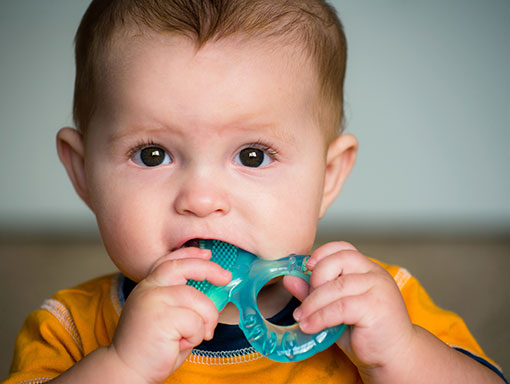Signs of Teething & Relief for Parents in Aurora, CO
New parents get a lot of advice about teething: when to expect it, how long it lasts, what the signs are, and what to do about it. Teething is the normal process of baby teeth trying to erupt through the gums, and there are effective ways to help your baby get through this phase of development.
From six to 24 months, infants may experience sore gums, fussiness and changes in behavior. When a child starts to drool more and constantly puts fingers and other objects in their mouth, the baby teeth are probably pushing to the surface. An infant’s gums can also look red or puffy when teeth are getting ready to erupt.
Effects of Teething
It helps to know how to deal with teething and understand which issues are related to this normal, developmental stage.
Pain
Mild gum irritation can be caused by particles of food rubbing against breaks in the gum caused by erupting teeth. You may worry about your child experiencing pain during teething, but the discomfort is often mild, and some babies don’t experience any pain. Others can find relief from sucking on a bottle of water or a cold teething toy.
Drooling
At around three or four months, most babies start to drool and put nearby objects into their mouths. This is the normal sensory exploration that infants use to find out about their environment. When teeth start coming in at around six to eight months, the drooling can intensify. Using absorbent bibs and changing them frequently during the day can help.
Rash
Drooling can cause a rash around the mouth and chin from small, irritating particles of food in the saliva. Frequent wiping of your child’s face with a wet cloth can help prevent this. Babies can also get rashes from being allergic to particular types of foods. To differentiate between rashes, feed your infant just one new type of food at a time.
Refusing Food
If teething pain is causing your baby to refuse food, try offering cool, soft choices such as yogurt or applesauce. Sometimes a bottle is more acceptable to a teething infant than solid food.
Sleeping Problems
Teething can sometimes cause changes in sleep habits, but this is less likely. If your baby has trouble sleeping or cries more than usual, a trip to the pediatrician can rule out other problems.
Relief for Teething Infants
A refrigerated teething ring can provide coolness that soothes your baby’s sore gums. Don’t freeze teething toys, though, as that could damage gum tissue. You can also rub your clean finger across your child’s gums to help alleviate the discomfort. If you have any questions or concerns in regard to teething, contact our office and speak to our dental professionals for more information.

